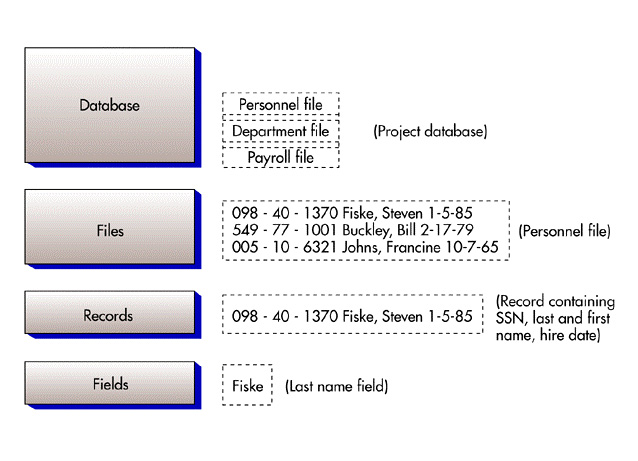What Is A Database: Before we start learning about what is a database, let us learn what is data?
Data: A data is a piece of information or facts. A data can be in any form like numbers, texts, piece of paper, measurements and bytes. For example, Student name, age, class, roll no. image etc. A file, pdf and document can also be a data.
Also See: What is File Processing System
What Is A Database
Now let us start our main topic what is a DATABASE?
There are many definition of database; some of them are given below:
- A database is made up of collection of files that interlinked to each other so that information from one file can be combined with other file and any person can get accurate results.
- A properly ordered collection of interlinked data that are related in a meaningful way which can be accessed in different logical orders but are stored only once.
- Database is structured store of indexed data that allows easy insertion, deletion and updating of data.
- A Database is defines as a systematic collection of data where you can easily fetch information. A database is made up of fields, records and files.
A field can be defines as a single piece of info.
A record is a collection of fields
And a file is made up of records or you can say collection of records.
WE can understand this like
Field +fields+ fields +fields +fields =record
Record+ records+ records + records + records = Files

In this diagram it is clearly shown that what is a database, file, record and field.
From all these definition given above, we have concluded some key features of DATABASE.
- Database is always well ordered.
- Database is interlinked.
- It is stored only once.
- Easy retrieval of information
- Made up of fields, records and files
For example a phone book carrying thousand of numbers in it is the basic example of database. In phone book you can search any number without any problem because all the numbers are arranged in a systemic order.
Other Examples are: Electric Service Provider, Address Book and Bill Book Etc.
Applications of Database: There are many application of database, few of them are given below.
- Flight reservation System
- Train reservation System
- Library System
- Universities Student information System
- Credit Card Transactions
- Banking
- Online Shopping Sites
Database Available in the market: Oracle, MySQL, FoxPro, IMS, IBM DB2, Big Data Etc.
Advantages of data Base: As database is required in every field, so it has many advantages, Few of these advantages are as.
- Minimal Redundancy
- Privacy and Security
- Easy Searching
- Integrity
- Consistency
- Simplicity
- Full Control
- Data Migration
Also See: Advantages of Database Management System
Disadvantages of database: In spite of having so many disadvantages, database has its own disadvantages.
- Very Costly
- High Hardware Cost.
- Sometime Complex
- Increased Vulnerability
Also See: Disadvantages of Database Management System
So it was a brief article about What is a DBMS? I hope you learned the basic definition of DBMS, If you want to ask anything about DBMS then feel free to comment below. If you liked it then please share it with your friends and colleagues.
Hi,
I am a data processing teacher in a school in Nigeria.Am planning to choose a career in computer science-network administrator. But I don’t know how to start.I will appreciate if u can assist.
Thanks
i m student in iformation technology i want to know more about programming, java,c, php,css,html,access,sql, but i don’t know how to know it